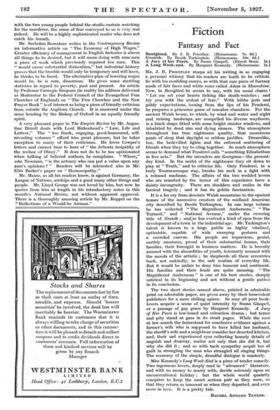Fiction
Fantasy and Fact
MR. 3. B. PRIESTLEY steeps all his writing in so engaging a personal whimsy that his readers are loath to be critical.
So with his confiding essays, so with that rare piece of fantasy made of fair faces and white roses called Adam in Moonshine.
Now, in Benighted, he seems to say, with his usual charm ” Let me set your hearts ticking like death-watches ; and try you with the ordeal of fear." With blithe jests and giddy expectations, issuing from the lips of his Penderel, he prepares a gruesome game of macabre chambers. For the ancient Welsh house, to which, by wind and water and night and ruining landscape, are compelled his diverse wayfarers,
is a black shape fitted with some bright sinister windows, and inhabited by dead sins and dying sinners. The atmosphere throughout has true nightmare quality, that monstrous panic of sleep that daylight so seldom justifies. Dreamlike, too, the bedevilled lights and the enforced scattering of friends when they try to cling together. So much atmosphere seems to demand what Penderel calls "something Elizabethan in five acts." But the intruders are Georgians—the present- day kind. In the midst of the nightmare they sit down to play at " Truth," and to criticize life. Only Penderel, in a truly Tourneuresque way, breaks his neck in a fight with a released madman. The affairs of the two wedded lovers who are reunited by the terror of this experience have a dainty incongruity. There are shudders and smiles in the farcical tragedy ; and it has its goblin fascination.
It is a far cry from desolate Welsh mountains to the opulent homes of the successive creators of the midland American city described by Booth Tarkington. In one large volume he has collected " The Magnificent Ambersons," " The Turmoil," and " National Avenue," under the covering
title of Growth ; and:so has evolved a kind of epos from the
development of a town in the industrial age. Mr. Tarkington's talent is known to a large public as highly vitalized, optimistic, capable of wide sweeping gestures and a crowded canvas. His people are loquacious, genial, earthly creatures, proud of their substantial homes, their families, their foresight in business matters. He is breezily amused with the absurdities of youth, tolerantly amused with the moods of the artistic ; he shepherds all these eccentrics back, not unkindly, to the safe routine of everyday life.
But it would be unfair to deny him humour and sentiment. His families and their feuds are quite amusing. " The Magnificent Ambersons " is one of his best stories, sharply satirical in its beginning and not without a gentle pathos in its conclusion.
The two short stories named above, printed in admirable print on admirable paper, are given away by their benevolent publishers for a mere shilling apiece. So may all poor book- lovers acquire a scene of quiet intensity by Susan Glaspell,
or a passage of gay grace by Margaret Kennedy. A Jury of Her Peers is low-toned and colourless drama ; but terror
and pity stand at gaze in its strait pages. While the men at law search the homestead for conclusive evidence against a farmer's. wife who is supposed to have killed her husband, the sheriff's wife and a neighbour consider her deserted kitchen, and, their sad experienced eyes collecting homely details of anguish and disarray, realize not only that she did it, but why she did it ; and so with tacit sympathy acquit her of guilt in strangling the man who strangled all singing things. The economy of the simple, dreadful dialogue is masterly.
Miss Kennedy's Long Week-End is a piece of tender comedy. Two ingenuous lovers, deeply read in "advanced" literature,
and with no money to marry with, decide solemnly upon an unconventional holiday ; but the whole world quaintly
conspires to keep the sweet serious pair as they were, so that they return as innocent as when they departed, and even more in love. It is a pretty taie.
RACHEL ANNAND TAYLEHLI


















































 Previous page
Previous page